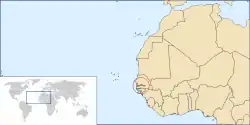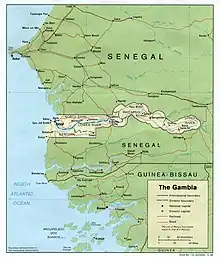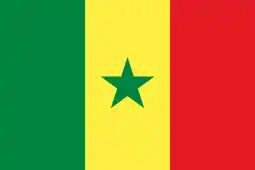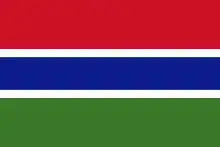Outline of the Gambia
The following outline is provided as an overview of and topical guide to the Gambia:


The Gambia – country in West Africa, officially named the Republic of the Gambia. The Gambia shares historical roots with many other West African nations in the slave trade, which was the key factor in the placing and keeping of a colony on the Gambia River, first by the Portuguese and later by the British. On 18 February 1965, the Gambia gained independence from the United Kingdom and joined the Commonwealth of Nations. Since gaining independence, the Gambia has enjoyed relative political stability, with the exception of a brief period of military rule in 1994.[1][2] Thanks to the fertile land of the country, the economy is dominated by farming, fishing, and tourism. About a third of the population lives below the international poverty line of US$1.25 a day.[3]
General reference
.png.webp)
- Pronunciation: /ˈɡæmbiə/
- Common English country name: The Gambia
- Official English country name: (The) Republic of the Gambia
- Common endonym(s):
- Official endonym(s):
- Adjectival(s): Gambian (disambiguation)
- ISO country codes: GM, GMB, 270
- ISO region codes: See ISO 3166-2:GM
- Internet country code top-level domain: .gm
Geography of the Gambia

- The Gambia is: a country
- Population of the Gambia: 1,709,000 people - 146th most populous country
- Area of the Gambia: 10,380 km2 (4,010 sq mi) - 164th largest country
- Atlas of the Gambia
Location
- The Gambia is situated within the following regions:
- Time zone: Coordinated Universal Time UTC+00
- Extreme points of the Gambia
- High: unnamed location 53 m (174 ft)
- Low: North Atlantic Ocean 0 m
- Land boundaries:
 Senegal 740 km
Senegal 740 km - Coastline: North Atlantic Ocean 80 km
Environment of the Gambia

- Protected areas of the Gambia
- Wildlife of the Gambia
- Fauna of the Gambia
Natural geographic features of the Gambia
- Glaciers in the Gambia: none [4]
- World Heritage Sites in the Gambia
Administrative divisions of the Gambia
Divisions of the Gambia
Districts of the Gambia
Municipalities of the Gambia
- Capital of the Gambia: Banjul
- Cities of the Gambia
Demography of the Gambia
Government and politics of the Gambia
- Form of government: unitary presidential republic
- Capital of the Gambia: Banjul
- Elections in the Gambia
- Political parties in the Gambia
Executive branch of the government of the Gambia
Legislative branch of the government of the Gambia
Foreign relations of the Gambia
International organization membership
The Republic of the Gambia is a member of:[5]
Law and order in the Gambia
- Constitution of the Gambia
- Human rights in the Gambia
- Law Enforcement in The Gambia
Military of the Gambia
History of the Gambia
History of the Gambia by period
History of the Gambia by subject
Culture of the Gambia
- National symbols of the Gambia
- Prostitution in the Gambia
- Public holidays in the Gambia
- Religion in the Gambia
- World Heritage Sites in the Gambia
Art in the Gambia
Sports in the Gambia
Economy and infrastructure of the Gambia
Education in the Gambia
See also
References
- http://www.globalpost.com/dispatches/globalpost-blogs/africa-emerges/peace-africa-not Gambia Ranked at no. 10 in Africa
- http://allafrica.com/stories/201009100241.html Empty Democracy v Democratic Dictatorship Suwaibou Touray 8 September 2010
- Human Development Indices, Table 3: Human and income poverty, p. 35. Retrieved on 1 June 2009
- The only glaciers in Africa are on Mt Kenya (in Kenya), on Kilimanjaro (in Tanzania), and in the Ruwenzori Mountains (which are located in Uganda and the Democratic Republic of the Congo). See Proceedings of the Riederalp Workshop, September 1978; Actes de l'Atelier de Riederalp, septembre 1978): IAHS-AISH Publ. no. 126, 1980.
- "The Gambia". The World Factbook. United States Central Intelligence Agency. July 3, 2009. Retrieved July 23, 2009.
External links
- State House and Office of the President
 Gambia travel guide from Wikivoyage
Gambia travel guide from Wikivoyage- The Gambia. The World Factbook. Central Intelligence Agency.
- Outline of the Gambia at Curlie
